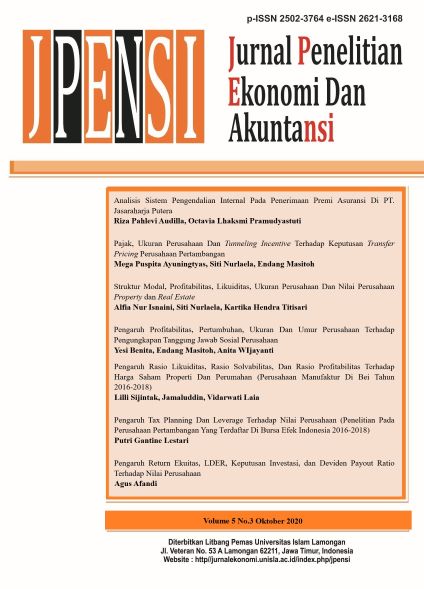Determinan Pengungkapan Laporan Berkelanjutan Berdasarkan Global Reporting Initiative
DOI:
https://doi.org/10.30736/jpensi.v6i2.635Kata Kunci:
Laporan berkelanjutan, laverage, profitabilitas, likuiditas, ukuran perusahaan, umur perusahaan, jenis auditorAbstrak
Perusahaan dituntut untuk ikut berpartisipasi dalam mewujudkan pembangunan berkelanjutan, namun tingkat pelaporan berkelanjutan di Indonesia masih sangat rendah. Tujuan dari penelitian ini adalah untuk menguji faktor-faktor yang berpengaruh dalam pengungkapan laporan berkelanjutan, beberapa variable independen yang dipilih adalah laverage, likuiditas, profitabilitas, umur perusahaan, ukuran perusahaan dan auditor. Penelitian ini menggunakan data sekunder dari laporan berkelanjutan perusahaan manufaktur dan tambang yang terdaftar di BEI tahun 2017-2019, data yang berhasil olah sebanyak 75 data. Hasil penelitian menunjukkan bahwa laverage, likuiditas, dan umur perusahaan tidak berpengaruh terhadap pegungkapan berkelanjutan, sementara profitabilitas, ukuran perusahaan dan audit berpengaruh terhadap pengungkapan laporan berkelanjutan.
Referensi
Aboud, A. and Diab, A. (2018), “The impact of social, environmental and corporate governance disclosures on firm value: evidence from Egyptâ€, Journal of Accounting in Emerging Economies, Vol. 8 No. 4, pp. 442-458.
Agyei, S.K. and Yankey, B. (2019), “Environmental reporting practices and performance of timber firms in Ghana: perceptions of practitionersâ€, Journal of Accounting in Emerging Economies, Vol. 9 No. 2, pp. 268-286.
Aksu, M. and Kosedag, A. (2006), “Transparency and disclosure scores and their determinants in the Istanbul Stock Exchangeâ€, Corporate Governance: An International Review, Vol. 14 No. 4, pp. 277-296.
Ali, W., Frynas, J.G. and Mahmood, Z. (2017), “Determinants of corporate social responsibility (CSR) disclosure in developed and developing countries: a literature reviewâ€, Corporate Social Responsibility and Environmental Management, Vol. 24 No. 4, pp. 273-294.
Allegrini, M. and Greco, G. (2013), “Corporate boards, audit committees and voluntary disclosure: evidence from Italian listed companiesâ€, Journal of Management and Governance, Vol. 17 No. 1, pp. 187-216.
Alsaeed, K. (2006), “The association between firmâ€specific characteristics and disclosureâ€, Managerial Auditing Journal, Vol. 21 No. 5, pp. 476-496.
Beck, C., Frost, G. and Jones, S. (2018), “CSR disclosure and financial performance revisited: a crosscountry analysisâ€, Australian Journal of Management, Vol. 43 No. 4, pp. 517-537.
Belal, A.R. and Owen, D.L. (2007), “The views of corporate managers on the current state of, and future prospects for, social reporting in Bangladesh: an engagement-based studyâ€, Accounting, Auditing and Accountability Journal, Vol. 20 No. 3, pp. 472-494.
Bose, S., Khan, H.Z., Rashid, A. and Islam, S. (2018), “What drives green banking disclosure? An institutional and corporate governance perspectiveâ€, Asia Pacific Journal of Management, Vol. 35 No. 2, pp. 501-527.
Bowrin, A.R. (2018), “Human resources disclosures by African and Caribbean companiesâ€, Journal of Accounting in Emerging Economies, Vol. 8 No. 2, pp. 244-278.
Bradley, N. (2004), “Corporate governance scoring and the link between corporate governance and performance indicators: in search of the Holy Grailâ€, Corporate Governance: An International Review, Vol. 12 No. 1, pp. 8-10.
Brammer, S. and Pavelin, S. (2008), “Factors influencing the quality of corporate environmental disclosureâ€, Business Strategy and the Environment, Vol. 17 No. 2, pp. 120-136.
Coffie, W., Aboagye-Otchere, F. and Musah, A. (2018), “Corporate social responsibility disclosures (CSRD), corporate governance and the degree of multinational activities: evidence from a developing economyâ€, Journal of Accounting in Emerging Economies, Vol. 8 No. 1, pp. 106-123.
Cormier, D., Magnan, M. and Van Velthoven, B. (2005), “Environmental disclosure quality in large German companies: economic incentives, public pressures or institutional conditions?â€, European Accounting Review, Vol. 14 No. 1, pp. 3-39.
Deegan, C.M. (2014), Financial Accounting Theory, McGraw-Hill Education, North Ryde.
DiMaggio, P.J. and Powell, W.W. (1991), The New Institutionalism in Organizational Analysis, University of Chicago Press, Chicago, IL, available at: https://doi.org/10.2307/258726
Dissanayake, D., Tilt, C. and Qian, W. (2019), “Factors influencing sustainability reporting bySri Lankan companiesâ€, Pacific Accounting Review, Vol. 31 No. 1, pp. 84-109.
Higgins, C., Milne, M.J. and van Gramberg, B. (2015), “The uptake of sustainability reporting in Australiaâ€, Journal of Business Ethics, Vol. 129 No. 2, pp. 445-468. Ho, L.C.J. and Taylor, M.E. (2007), “An empirical analysis of triple bottom line reporting and its determinants: evidence from the United States and Japanâ€, Journal of International Financial Management & Accounting, Vol. 18 No. 2, pp. 123-150.
Mukherjee, A. and Nuñez, R. (2019), “Doing well by doing good: can voluntary CSR reporting enhance financial performance?â€, Journal of Indian Business Research, Vol. 11 No. 2, pp. 100-119.
Orazalin, N. (2019), “Corporate governance and corporate social responsibility (CSR) disclosure in an emerging economy: evidence from commercial banks of Kazakhstanâ€, Corporate Governance: The International Journal of Business in Society, Vol. 19 No. 3, pp. 490-507.
Orazalin, N. and Mahmood, M. (2018), “Economic, environmental, and social performance indicators of sustainability reporting: evidence from the Russian oil and gas industryâ€, Energy Policy, Vol. 121, pp. 70-79.
Siddiqui, J. and Uddin, S. (2016), “Human rights disasters, corporate accountability and the state: lessons learned from Rana Plazaâ€, Accounting, Auditing and Accountability Journal, Vol. 29 No. 4, pp. 679-704.
Watson, A., Shrives, P. and Marston, C. (2002), “Voluntary disclosure of accounting ratios in the UKâ€, British Accounting Review, Vol. 34 No. 4, pp. 289-313.
Watts, R.L. and Zimmerman, J.L. (1983), “Agency problems, auditing, and the theory of the firm: some evidenceâ€, The Journal of Law and Economics, Vol. 26 No. 3, pp. 613-633.
Unduhan
Diterbitkan
Terbitan
Bagian
Lisensi
Hak Cipta (c) 2021 Jurnal Penelitian Ekonomi dan Akuntansi (JPENSI)

Artikel ini berlisensi Creative Commons Attribution-NonCommercial-NoDerivatives 4.0 International License.


2.png)
_(1)1.jpg)


.png)
_(1)_(1).jpg)
1.png)

1.png)
.png)
11.png)
2.png)


